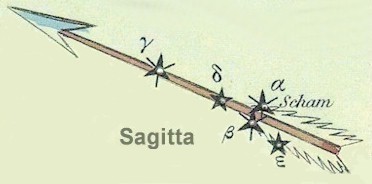| Fixed star: SHAM | |
| Constellation: Alpha (α) Sagitta | |
| Longitude 1900: 29CAP41 | Longitude 2000: 01AQU04 |
| Declination 1900: +17.47′ | Declination 2000: +18.00′ |
| Right ascension: 19h 39m | Latitude: +38.47′ |
| Spectral class: F8 | Magnitude: 4.4 |
The history of the star: Sham
Urania’s Mirror 1825
Alpha (α) Sagitta, Sham, or Scham, is the western star in the shaft of the Arrow.
Sham comes from the Arabic Al Sahm or Alsoham, "Arrow".
Star Names, Their Lore and Meaning, Richard Hinckley Allen, 1889].
The astrological influences of the constellation Sagitta
Legend: Sagitta represents the arrow with which Hercules slew the eagle (Aquila) that fed upon the liver of Prometheus. [Robson, p.59.]
Influences: According to Ptolemy this constellation is like Saturn and moderately like Venus, but Bayer states that it is of the nature of Mars and Venus. It is said to give a keen mind with ability for abstract thought and teaching or writing, irritability, jealousy and danger of hostility and bodily harm. [Robson, p.59.].
If setting [with any star in the constellation?], drafted into the army and dies in battle, or one who will die as a gladiator. Keen mind and ability for abstract thought, with a great deal of intellectual energy and with a tendency to be combative and opinionated. A successful hunter. Violent weather. [Fixed Stars and Judicial Astrology, George Noonan, 1990].
The astrological influences of the constellation Sagitta given by Manilius:
Sagitta, The Arrow, will bestow the skill of hurling the javelin with the arm, of shooting the arrow from the string and missiles from rods, and of hitting a bird on the wing in the sky that is its home or piercing with three-pronged spear the fish that deemed itself so safe. What constellation or nativity should I rather have given Teucer? To what degree should I prefer to assign Philoctetes? His bow enabled Teucer to repel the flaming torches of Hector which threatened to pour fell fire upon a thousand ships (Those of the Greeks at Troy). Carrying in his quiver the fate of Troy and the Trojan War, Philoctetes*, who tarried in exile, proved a foe more potent than an armored host.
"Under this constellation indeed may well have been born that luckless parent who caught sight of a serpent couched upon his son’s face and sapping the life-blood of the sleeping child, but nerved himself to let fly a shaft at it and succeeded in killing the reptile. Fatherhood supplied his skill; a natural instinct overcame the danger and delivered the boy from sleep and death alike, given then a second life and snatched whilst dreaming from the grave".
[Translator’s note:*It was decreed that Troy could not be taken without the arrows of Hercules; these were held by Philoctetes, who, afflicted with a noisome wound in the foot, had been abandoned by the Greeks in Lemnos; subsequently healed and brought to Troy, he slew many of the Trojans, including Paris. Unlike most of the Greeks Philoctetes, as an archer, wore no armor]. [Manilius, Astronomica, 1st century AD, book 5, p.235].
References:
Fixed Stars and Constellations in Astrology, Vivian E. Robson, 1923].
